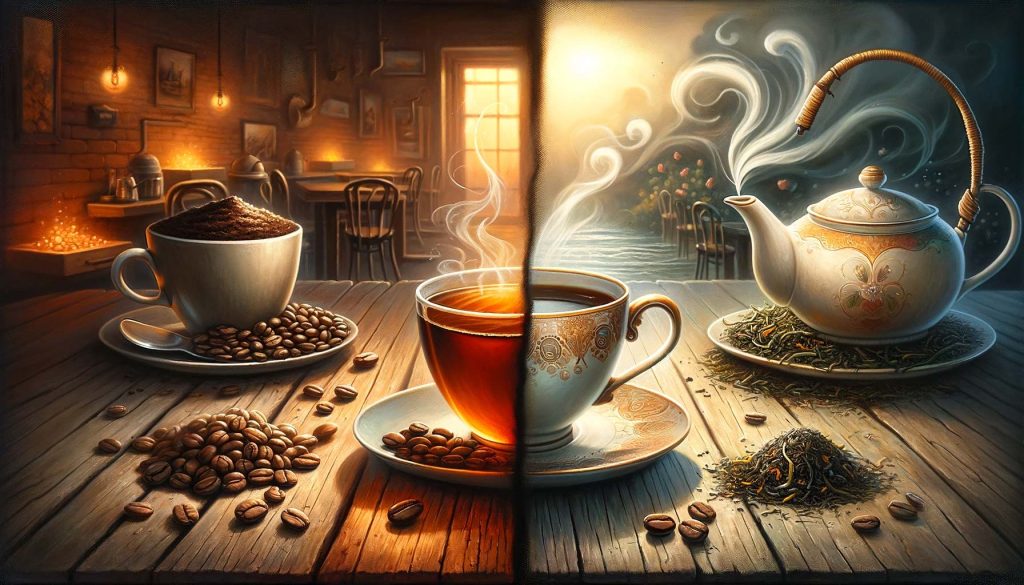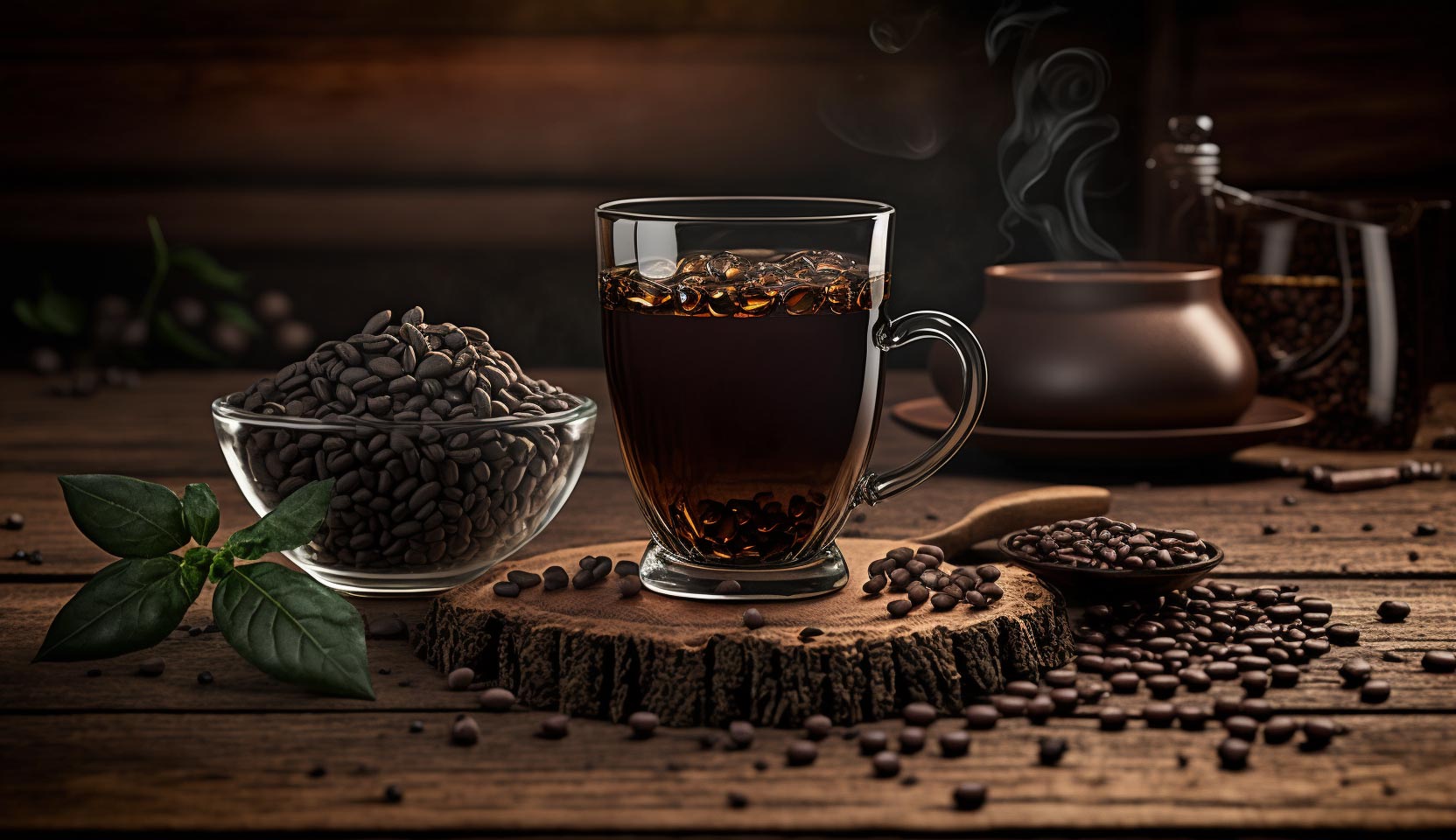In the vast universe of beverages, coffee and tea stand as timeless titans, revered and sipped across the globe for centuries. As each steaming cup carries with it a symphony of flavors and preparation rituals, the perennial question lingers: which elixir reigns supreme? In the pages of this article, we embark on an odyssey to dissect the virtues and shortcomings of coffee and tea, unraveling the intricate threads that weave their tales. Prepare to navigate the aromatic labyrinth and unearth the nuances that will guide you toward the brew that aligns most harmoniously with your discerning palate and lifestyle.

History
- Coffee: Coffee has been around for centuries. It is believed to have originated in Ethiopia.
- Tea: Tea has also been around for centuries. It is believed to have originated in China.
Production
- Coffee: Coffee beans are roasted and then ground to make coffee.
- Tea: Tea leaves are steeped in hot water to make tea.
Caffeine content
- Coffee: Coffee has a higher caffeine content than tea. A cup of coffee has about 100 milligrams of caffeine, while a cup of tea has about 40 milligrams of caffeine.
Health benefits
- Coffee: Coffee has been shown to have several health benefits, including reducing the risk of heart disease, stroke, and type 2 diabetes.
- Tea: Tea has also been shown to have several health benefits, including reducing the risk of cancer, heart disease, and stroke.
Taste
- Coffee: Coffee has a strong, bitter taste.
- Tea: Tea has a more delicate flavor.
Coffee vs. tea: Which is better?
The answer to this question depends on your personal preferences. If you are looking for a drink with a high caffeine content, then coffee is a good choice. Tea is a good choice if you want a drink with a more delicate flavor.
Health Benefits
In the intricate tapestry of health narratives, both coffee and tea unfurl as potent elixirs, each bearing a bouquet of potential benefits. Coffee, with its caffeine-laden embrace, emerges as a sentinel of alertness, elevating cognitive function to new heights. Its allure extends further, entwining with a reduced risk of specific cancers, such as liver, colorectal, and prostate cancer, painting a complex portrait of health fortification.
Conversely, tea, steeped in the tranquil depths of antioxidants, becomes a guardian against inflammation and cellular harm. The symphony of benefits crescendos with associations of lower risks of heart disease and stroke, casting a protective veil over the cardiovascular realm. The echoes of tea’s protective prowess resound in the lower probabilities of certain cancers; a narrative spun with threads that weave tales of defense against breast and ovarian cancer.
As we navigate this verdant terrain of health elixirs, the choice between coffee and tea may not be merely a matter of preference but a mindful sip into the wellspring of potential well-being, where the aromatic nuances of each cup hold the promise of a healthful journey.
Caffeine Content
In the caffeinated realm, a stark divergence manifests between coffee and tea, encapsulating a crucial disparity in their stimulant profiles. The caffeine chronicle unfolds with coffee reigning as the undisputed monarch, boasting an average cup content of around 95 mg, a potent elixir that bestows a robust morning jolt. In contrast, the tea, a gentler sentinel, cradles a milder caffeine presence, averaging between 30-50 mg per cup.
For those seeking the swift embrace of morning vigor, the coffee, with its elevated caffeine stature, stands as the paragon of awakening. However, in the delicate dance of caffeine sensitivity or a preference for a more tempered infusion, the tea emerges as the nuanced choice—a milder companion that still whispers a caffeinated sonnet, ideal for those who seek a subtle uplift without the thunderous cadence of a coffee’s caffeine surge.
Flavor Options
In the kaleidoscope of taste, both coffee and tea unveil an expansive palette, beckoning enthusiasts to explore and savor a symphony of flavors and preparations. Coffee, a versatile muse, can be relished in its pure essence or adorned with the opulence of cream, sugar, or flavored syrups, offering a customizable canvas for individual palates. Conversely, tea’s allure transcends temperature boundaries, presenting itself in both hot and cold incarnations, with the potential for embellishments like honey, lemon, or milk to further elevate its sensory poetry.
Delving deeper into the realm of variety, coffee aficionados navigate the diverse landscape of beans, each yielding a distinct taste profile that enriches the morning ritual. Meanwhile, tea enthusiasts traverse the expansive territories of tea leaves, whether indulging in the robust embrace of black tea, the verdant nuances of green tea, or the herbal whispers of various infusions.
In this symposium of flavors, coffee and tea stand as versatile artisans, beckoning to be explored and celebrated, each cup an invitation to embark on a sensory journey through the intricate landscapes of taste.
Environmental Impact
As we conclude our exploration of the coffee and tea dichotomy, the environmental symphony emerges as a critical note in the consumption harmony. Coffee, with its production demanding substantial water resources, often casts a shadow on the environment, leaving imprints of deforestation and soil degradation in its wake.
In contrast, tea cultivation unfolds as a more environmentally conscious ballet, often swaying to the rhythm of shade-grown farming practices and a reduced thirst for water compared to coffee production. The verdant hills of tea plantations offer a canvas where sustainability takes root, with some tea companies committing to ethical production practices, embracing the principles of Fairtrade and organic farming.
In this ecological reckoning, the discerning sipper is invited to ponder the aromatic nuances in their cup and the ecological footprint accompanying their beverage of choice. The narrative extends beyond the palate, echoing the impact of consumer choices on the delicate threads of our planet’s ecosystem.

Conclusion
As the curtain falls on the coffee and tea contemplation, the ultimate decision becomes a personal sonnet, harmonized by individual preference and health considerations. In this delicate dance of beverage selection, the scales tip towards the allure of a quick morning energy surge with coffee or the subtler caffeine embrace and potential health benefits offered by tea.
The nuanced journey unfolds uniquely for each sipper, resonating with the cadence of personal tastes and health needs. For those seeking an ethical thread in their brew, the call is to align with brands and products that unfurl the banner of sustainable and ethical production practices, allowing conscientious sippers to intertwine their sips with a commitment to environmental stewardship.
In this final sip, the symphony of choice rests on the lips of the beholder, an individualized narrative woven from the threads of preference, health consciousness, and a whispered allegiance to the planet’s well-being.
FAQ
Which drink has more caffeine, coffee or tea?
Coffee generally has more caffeine than tea. On average, a cup of coffee contains around 95 mg of caffeine, while a cup of tea contains around 30-50 mg of caffeine. However, the exact amount of caffeine in each drink can vary depending on factors such as the type of coffee or tea and how it is brewed.
Is it better to drink coffee or tea for health?
Both coffee and tea have been associated with various health benefits. Coffee has been linked to a reduced risk of certain types of cancer, while tea has been associated with a lower risk of heart disease and stroke. The best choice for your health depends on your individual needs and health goals. It is recommended to consume both in moderation as part of a healthy diet.


1 Comment